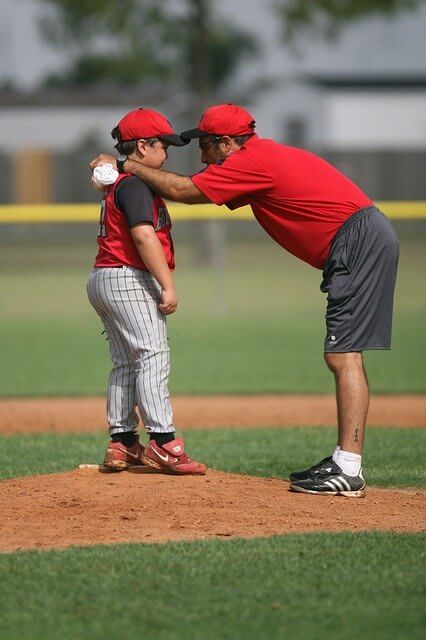Last Updated on June 6, 2023
Baseball is the most favorite sport in the USA. We always discuss how much baseball players make and why.
But behind every successful team is a dedicated coach, working tirelessly to shape and guide their athletes toward victory.
While we often hear about the salaries of professional baseball players, have you ever wondered how much these coaches make?
In this blog post, I’ll dive into the world of baseball coaching salaries – from high school to the major leagues – exploring what factors influence pay and which coaches are making bank.
Average Salary of Baseball Coaches
High School Coaches
High school coaches are important to the communities they serve. They serve as role models for young athletes and are entrusted with guiding them to personal and professional growth.
High school coaches often work long hours because they have to juggle practice plans, game days, and administrative tasks.
According to Zip Recruiter, As of May 10, 2023, the average annual pay for a High School Baseball Coach in the United States is $51,219 a year.
In addition to their coaching responsibilities, many high school coaches also serve as teachers or staff members at their respective institutions. This can include teaching physical education classes or serving as guidance counselors.
Despite the challenges that come with being a high school coach, it is a rewarding job. Seeing young athletes grow and achieve success both on and off the field can be incredibly fulfilling.
College Baseball Coaches

The salaries of college baseball coaches vary widely depending on their team’s level of competition and success. The NCAA Division I level is the most competitive, with some head coaches earning over $1 million per year.
However, smaller colleges may only pay their baseball coach a part-time stipend.
Salary also depends on the location and prestige of the school. Head coaches at top-tier schools like Vanderbilt or LSU can earn significantly more than those at smaller schools with less successful programs.
The average salary of college coaches is USD 55 thousand, according to Glassdoor, but this is just average with very high differences.
While assistant coaches’ earnings normally fall in the region of $30,000 to $100,000 annually, they are still respectable compared to head coaches. Health insurance and retirement plans are common perks they receive.
However, college baseball coaching can be a lucrative career path for some; it requires dedication and hard work to build a successful program and reach high-paying positions.
Youth Coaches Salary

Youth baseball coaches often have a significant impact on young players’ lives, helping them develop skills and fostering a love for the game.
Youth league coaches generally receive lower pay than high school coaches since youth leagues often rely heavily on volunteers.
However, some well-established organizations have offered paid coaching positions with salaries averaging around $18 per hour. (Source: Zip Recruiter)
Youth coaches typically work with players aged between 4 and 18 years old. They are responsible for teaching the basics of baseball while prioritizing safe play and sportsmanship.
Most young baseball coaches are unpaid or volunteer. In many cases, they might hold full-time jobs outside of coaching or be parents who coach their children’s teams out of a passion for the sport.
That said, some paid positions exist at competitive travel ball organizations or more elite youth leagues. These positions offer respectable salaries depending on factors like location, experience level, and team success.
Professional Coaches Salary

There is a wide range of pay for professional baseball managers, depending on factors such as years of experience, level of competence, and budget.
The average monthly salary for a coach in Minor League Baseball (MiLB) is between $1,000 and $3,000.
If they make it to Major League Baseball, they can expect annual salaries of $100,000 and up.
Remember, though, that only a small percentage of managers in Minor League Baseball actually make it to the Majors.
Performance expectations and team success also play a large role in the high turnover rate of professional coaches.
Winning games and hitting certain milestones can earn professional baseball managers bonuses on top of their regular pay. They might also be eligible for benefits like retirement and health insurance.
Additional Benefits for Coaches.
Being a baseball coach takes a lot of dedication, stamina, and passion. Baseball managers are paid a salary, which is significant, but they also frequently receive various bonuses.
Coaches benefit greatly from health insurance. Many institutions and organizations provide coaches with comprehensive health insurance plans.
Those with families or preexisting conditions may find this perk very helpful.
Retirement plans like 401(k)s and pensions are also commonly offered to baseball coaches.
These programs allow individuals to save money for retirement while receiving tax advantages and employer contributions.
In addition to financial benefits, some baseball coaches receive perks like travel allowances or access to team facilities outside of practice times.
These amenities can make a big difference in the quality of life for a coach and help them perform at their best on and off the field.
Some organizations offer professional development opportunities such as clinics, seminars, or workshops where coaches can learn new skills and techniques from industry experts.
These experiences enhance the coach’s knowledge and allow them to network with other professionals in the field.
Other Sources of Income for a Baseball Coach

Baseball coaches have numerous opportunities to supplement their salaries.
Private lessons are one option. Many coaches offer profitable one-on-one or small-group coaching sessions.
Earning money through endorsements and sponsorships is another option for coaches.
Professionally successful coaches may be approached by brands interested in forming partnerships and endorsing their wares.
Coaches can supplement their income by running baseball camps.
During off-seasons or breaks in their regular schedule, many coaches run or participate in baseball camps where they teach young athletes the fundamentals of the game.
Some college and professional teams even offer bonuses or incentives to their coaching staff based on team performance. This encourages coaches to work harder and contribute more towards achieving team goals.
Some coaches write books or create instructional videos to generate income while sharing their knowledge and expertise with others.
There are various ways that baseball coaches can increase their earnings beyond just a salary from an organization. These opportunities provide financial benefits and allow them to continue developing skills within the industry they love so much – baseball!
Highest Paid Baseball Coaches
You may make a good living at it if you have what it takes to be a winning baseball coach. Leaders at elite American colleges like Vanderbilt University pay baseball coaches some of the highest salaries.
For example, it has been reported that Vanderbilt’s head coach, Tim Corbin, earns more than $1 million annually.
He was reported to earn more than 11 MLB managers! (Source: The Tennessean)
Other high-earning college coaches include Arizona State’s Tracy Smith and LSU’s Paul Mainieri.
In professional baseball, Major League Baseball managers often command higher salaries than minor league managers due to the level of prestige associated with managing at the highest level.
Joe Maddon, manager of the Los Angeles Angels, was one of the highest-paid coaches in Major League Baseball, earning an estimated $6 million annually.
Factors Influencing Baseball Coach Salaries
Experience and Expertise
Experience and expertise are two critical factors that can significantly influence a baseball coach’s salary. Coaches who have been in the industry for several years usually command higher salaries than those with less experience.
This is because seasoned coaches have perfected their craft, gained wisdom from their failures, and created winning game plans.
A coach’s remuneration may also be influenced by their level of skill in a particular field, such as pitching or hitting. Teams wanting to improve in these areas may be more interested in hiring coaches with expertise in these areas.
A coach’s salary is also heavily influenced by their standing in the industry. It stands to reason that a coach with a longer and more spectacular list of accomplishments will command a higher salary.
Experience and expertise are crucial considerations when it comes to determining how much a baseball coach makes. The longer you’ve been coaching and the more specialized your skills are, the better your chances of commanding a higher salary within this competitive field.
How Years of Coaching Experience Can Affect Salary
Years of coaching experience can have a significant impact on the salary that coaches receive.
Coaches with more expertise and a history of winning typically earn more than their less seasoned counterparts.
This is because coaches with more experience on the field tend to have a more nuanced appreciation for the complexities of the game.
They will have amassed a wealth of contacts in the field, which can be used to their advantage when looking for new coaching jobs or bargaining for higher compensation.
Additionally, companies tend to place more trust in coaches with more expertise.
They may also be less risky investments since they have already demonstrated an ability to produce results over a sustained period.
However, there are exceptions to this rule, particularly at the lower levels of coaching, where experience may not necessarily translate into higher salaries.
In some cases, entry-level positions may actually pay more than jobs requiring several years’ worth of experience due to factors such as demand and competition for roles.
How Expertise in Specific Areas (e.g., Pitching, Hitting) May Command Higher Salaries.
The salary of a baseball coach typically depends on the coach’s level of competence in specific areas, such as pitching and hitting.
A baseball coach’s salary may depend heavily on his or her level of competence in a specific area, such as pitching or hitting.
There is intense rivalry for instructors with experience in these areas, particularly at the professional level.
For example, a pitching coach may have years of expertise working with professional athletes and crafting unique plans to increase each pitcher’s precision and velocity. In baseball, these kinds of skills can make a major difference in a team’s chances of success.
Similarly, hitting coaches can help a team or an individual’s offensive production.
Swing analysis, hand-eye coordination drills, and mental training are just a few of the methods a coach could use.
Due to their reputation for drawing top players, these coaches may be able to negotiate higher fees.
Players recognize the value of working with knowledgeable coaches who can help them reach their full potential on the field.
It is clear that expertise in specific areas, such as pitching or hitting, is highly valued within the world of baseball coaching and can lead to significant financial rewards for those who possess it.
Level of Coaching
The level of coaching is an important factor that influences the salary of baseball coaches.
As a coach moves up the ranks, from youth to high school, college, and professional levels, his or her responsibilities and expectations increase.
Starting at the youth level may mean earning less than more experienced coaches; however, it can provide valuable experience in working with young players.
High school coaches are typically full-time teachers who earn additional compensation for coaching duties. They have demanding jobs as they must balance teaching responsibilities with their coaching duties during the season.
College coaches have even higher expectations placed on them by universities and their athletic programs. They must recruit top talent while also developing their current roster into successful athletes.
Professional baseball coaches work at various levels within minor league organizations before potentially making it to Major League Baseball (MLB). Salaries vary widely based on position and success within each organization.
As a coach progresses through different levels of coaching positions, salaries and expectations, and requirements for success increase.
Increasing Expectations and Responsibilities Associated with Higher Coaching Levels.
As a baseball coach progresses up the ranks, from high school to college and ultimately professional levels, the expectations and responsibilities increase significantly.
High school coaches may have fewer players to manage and less pressure to win than their higher-level counterparts. However, they are still responsible for developing young athletes both on and off the field.
College coaches face elevated pressure since winning games can impact university budgets, student recruitment efforts, and overall team morale.
They must also balance athletic success with academic achievement while managing a larger roster size than high school teams.
Professional baseball coaches shoulder immense responsibility as they manage multi-million dollar contracts of star players in front of thousands of fans.
Their job involves analyzing performance data to make strategic decisions for each game while keeping morale high among their team members.
The increasing expectations and responsibilities that come with higher coaching levels require strong leadership skills, advanced knowledge of technical aspects of the sport, and excellent communication abilities with parents or stakeholders like management officials in professional settings – all under intense scrutiny from media outlets who will scrutinize every move made by them.
Location and Market Demand
Location and market demand play a significant role in determining the salary of baseball coaches.
The cost of living in different areas affects what schools, colleges, or professional teams can afford to pay their coaches.
For instance, a coach working for a team based in New York City will earn more than one working for a similar team based in rural Kansas.
Market demand also plays an important part in coaching salaries. Coaches who work with high-performing teams that attract large crowds generate more revenue for their employers, which translates into higher salaries.
In contrast, coaches of less successful teams may not command as high a salary, even if they possess equal qualifications and experience.
What it Takes to Become a Baseball Coach
It takes more than a passion for baseball to make it as a coach. It requires focus, effort, and a drive to grow and develop.
Gaining playing experience is the first requirement for a coaching career. Insights gained from playing can be invaluable, whether at the high school or collegiate level.
Effective coaching also necessitates fluency in speaking and listening. Trust and team cohesion are built through open lines of communication between coaches, players, and parents.
One of the keys to being a great coach is to always learn. So, focus on study. Yes, academic studies also matter.
Attending coaching clinics and conferences can help coaches stay up-to-date on new techniques and trends in the sport.
Networking with other coaches can also help find job opportunities or learn from experienced mentors.
Understanding sports psychology can be beneficial for coaches when it comes to motivating their players and helping them overcome mental barriers that may affect their performance on the field.
Becoming a successful baseball coach takes passion for the sport and dedication to self-improvement, both personally and professionally.
Final Words
A baseball coach’s salary can vary widely depending on many factors, as evidenced by the wide variety of reported figures.
How much money a coach makes depends on several factors, including their amount of expertise, the nature and size of the team they’re in charge of, and their location.
Baseball coaches typically make a salary of between $35,000 and $50,000 per year. This range may be more for some head coaches than for their assistants.
You need to have patience and dedication to the game if you wish to succeed in this field.
More Resources
How Much Do MLB Cheerleaders Make?
How Much Money Do Baseball Players Make In A Year
How Much Do Baseball Scouts Make

Hello everyone. My name is Jason Butler, and I live in California, America. I was a professional AAA Minor League Baseball player. I lost my chance of playing MLB for injury issues, but I did not lose my love for baseball. I attended the coaching training program and am now working as a coach in a small school in San Diego.
I always love to share my experience and knowledge if that can help you. Play baseball, and stay fit.
